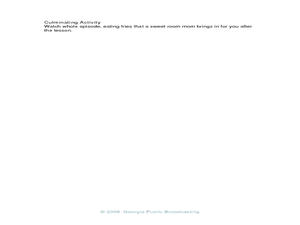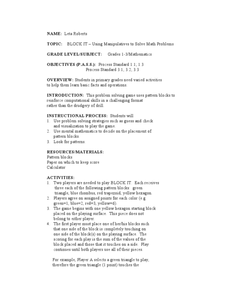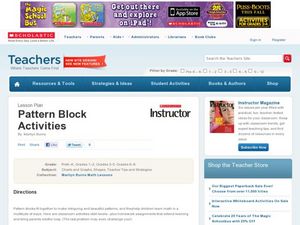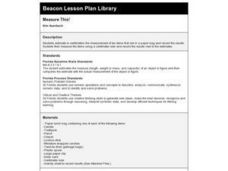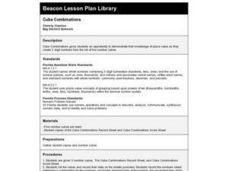Curated OER
What's in the Bag?
Help your young scholars identify the attributes of two-dimensional shapes. They read the book Round is a Mooncake, and use pattern blocks to sort shapes. Students sort shapes according to their attributes.
Hawaiʻi State Department of Education
Mask Symmetry
When you engage learners in creating symmetrical objects you are also building their vocabulary and math sense. Kids discuss key words such as, asymmetrical, symmetrical, balance, tint, and shade. They use these elements of design to...
Primary Junction
Adding Tens
Build on your learners' confidence in quick addition as they discover strategies to add tens to two-digit numbers. After reviewing counting by 10's, they discuss tactics to add multiples of 10 to other numbers. They visualize how to...
Curated OER
Problem Solving
Students explore the concept of problem solving. In this problem solving lesson, students use a decision square to solve a word problem. Students practice using a decision square to problem solve.
Curated OER
French Fry Run
Student explore estimation and measurement. In this measurement lesson, 2nd graders measure french fries, graph their data, and determine the size of french fries that is the best value. Students practice how to add prices and calculate ...
Curated OER
Cent Sense
Learners identify money values. In this money instructional activity, students sort and group coins by value and investigate the cost of supplies needed for a snack. Learners prepare snacks for a snack sale.
Curated OER
Why We Trade: Exchanging Goods and Services
Students conduct simple bartering and trading activities and consider how product value can be altered by the market.
Curated OER
Get Ready, Get Set, Squeeze!
Students explore coin value and count coin combinations. In this money counting and social studies lesson, students read The Coin Counting Book by Rozanne Lanczak Williams and practice counting money and making change for a lemonade...
Curated OER
Decimal Notation for Pennies and Dimes
Second graders write money in decimal form. In this money lesson, 2nd graders discuss the value of coins and find the placement of the decimal in writing the amount. They find the fractional parts of coins in a dollar.
Curated OER
Helping
Students awareness is raised when they are called to look after one's surrounding and have a good attitude toward helping others and working cooperatively. Students write down times of day and how that time was wasted and time helping...
Curated OER
Money in Action
Students become familiar with the various coins in our money system as well as amount of each coin. They help develop their ability to count change and find different ways to show equal amounts.
Curated OER
Block It: Using a Manipulative to Solve Math Problems
Students practice using visuals to solve math problems. In this math manipulative lesson, students utilize pattern blocks to participate in a class game in which geometric shapes touch other player's pieces. Students gain points based on...
Curated OER
Ordering Fractions and Decimals
Students place fractions and decimals with unlike values in correct numerical order.
Curated OER
Pattern Block Activities
Pupils practice various math skills by using manipulative activities. In this math manipulative lesson, students sort shapes, build hexagons, and build shapes using manipulatives. These activities would be great for parent ed or homework.
Pennsylvania Department of Education
What Balances?
Students explore another meaning of subtraction as it pertains to the inverse of addition. In this what balances lesson, students identify the concept of subtraction as a balance. Students use subtraction facts to generate addition...
Pennsylvania Department of Education
Seeing Doubles
Young scholars work with dominoes to recognize the number of spots on each side as they relate to addition facts. In this seeing doubles lesson, students make triangle shaped flash cards for the double facts. Young scholars represent the...
Pennsylvania Department of Education
Multiple Patterns
Students explore patterns that involve doubling numbers. In this multiple patterns lesson, students use objects to explore these patterns while recording them using a table. Students recognize even and odd number patterns while applying...
Education World
High, Low, or In Between?
Trios play a card game that reinforces the concepts of number sequence and greater than and less than. Scholars make predictions based on information they know and a single unknown. They see cards drawn by others in the group, but not...
Curated OER
Valentine's Themed Activities For February
Here are ways to make academics part of your Valentine's Day-related lessons.
Curated OER
Measure This!
Students estimate the measurement in centimeters for common classroom objects. They check their estimations, discuss the differences and write a paragraph summarizing the activity.
Texas Commission on the Arts
The Quarter Fold
Little ones identify the US quarter and explore the concept of one-fourth or one-quarter. Using real coins or coin manipulatives, they divide a square piece of paper into quarters, discuss halves and quarters, and create a design that...
Alabama Learning Exchange
Partying with Two/Three Digit Whole Numbers
Learners practice problem-solving with this addition activity. They plan a party for their class and another class by determining how many cupcakes are needed. Students draw a picture of how they determined the number of cupcakes.
Curated OER
Probability or Ability?
Young scholars toss candy and coins using their non-dominant hand while their partners records the results on a probability charts.
Curated OER
Cube Combinations
Second graders, given 5 number cubes, roll the cubes and record the data.






